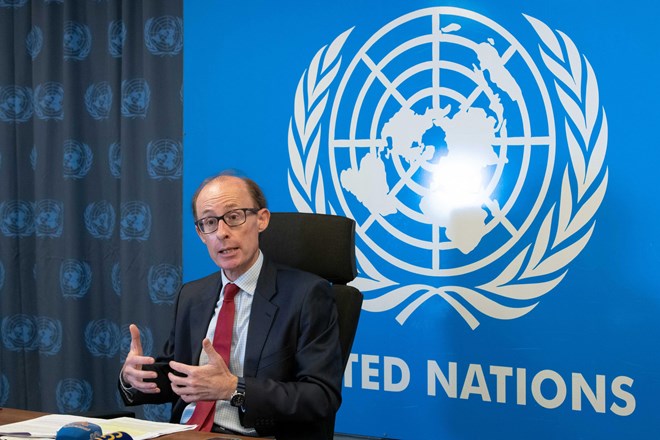
Thursday May 22, 2025

Mogadishu (HOL) — A United Nations expert has called on the international community not to abandon Somalia as it faces persistent and complex challenges in its fight against terrorism.
Speaking at the end of an official visit on Wednesday, UN Special Rapporteur on human rights and counter-terrorism, Ben Saul, expressed solidarity with the Somali people and government in the face of persistent terrorist threats, while warning against human rights setbacks in the name of security.
“I recognise the extensive efforts by the Somali authorities to prevent terrorism, through a comprehensive strategy combining law enforcement, military operations, combating violent extremism and addressing the root causes of terrorist recruitment,” the Special Rapporteur on the promotion and protection of human rights and fundamental freedoms while countering terrorism, Ben Saul said.
“I also acknowledge Somalia’s severe security and resource constraints,” he added.
However, Saul noted with concern that Somalia has adopted excessive and overbroad terrorist definitions and offences, as well as expansive intelligence and security powers that could compromise fundamental human rights. He warned that some terrorism offences attract the death penalty even when they do not involve intentional killing, as required under international law.
During his visit, the expert received reports of arbitrary arrests, protracted pre-trial detention, lack of legal representation, possible enforced disappearance, excessive use of force, and ill-treatment in detention.
“I am deeply concerned about widespread violations against children in armed conflict, including killings, maiming, forced recruitment, sexual and gender-based violence, and trafficking,” the Special Rapporteur said.
Saul said he was particularly concerned about the use of military courts to try terrorist suspects, which lack sufficient independence and fair trial safeguards.
“Prison conditions also do not meet international standards,” he said.
While acknowledging progress in military operations against terrorist groups, Saul expressed concern about what he described as military forces lacking the necessary rules, procedures and accountability mechanisms to prevent, prosecute and remedy violations. He also expressed deep concern over the use of clan militias alongside the military, in the absence of a legal framework to safeguard human rights.
The expert called on Somalia and its international partners to prioritize the rehabilitation and reintegration of former combatants, especially women who have survived sexual and gender-based violence within extremist groups. He also warned that counter-terrorism financing laws risk hampering the delivery of humanitarian aid to communities in desperate need.
“Counter-terrorism laws are also adversely affecting the freedom of the media to report on security matters and restricting and chilling the human rights work of civil society organizations,” Saul said.
“I encourage Somalia to establish independent and effective oversight and accountability mechanisms for all counter-terrorism actors, redouble efforts to address root causes, pursue conflict resolution and peace-making, strive for inclusive and participatory governance, and combat corruption, poverty and discrimination against minorities.”
He encouraged international partners to maintain political and financial support for Somalia, in the face of devastating recent funding cuts by some donors.
“This is a critical moment for Somalia,” he said. “Sustained international engagement is essential to support national efforts to build lasting peace, strengthen rule of law, and protect human rights while countering terrorism.”
The Special Rapporteur is expected to present a detailed report of his findings to the UN Human Rights Council in March 2026.